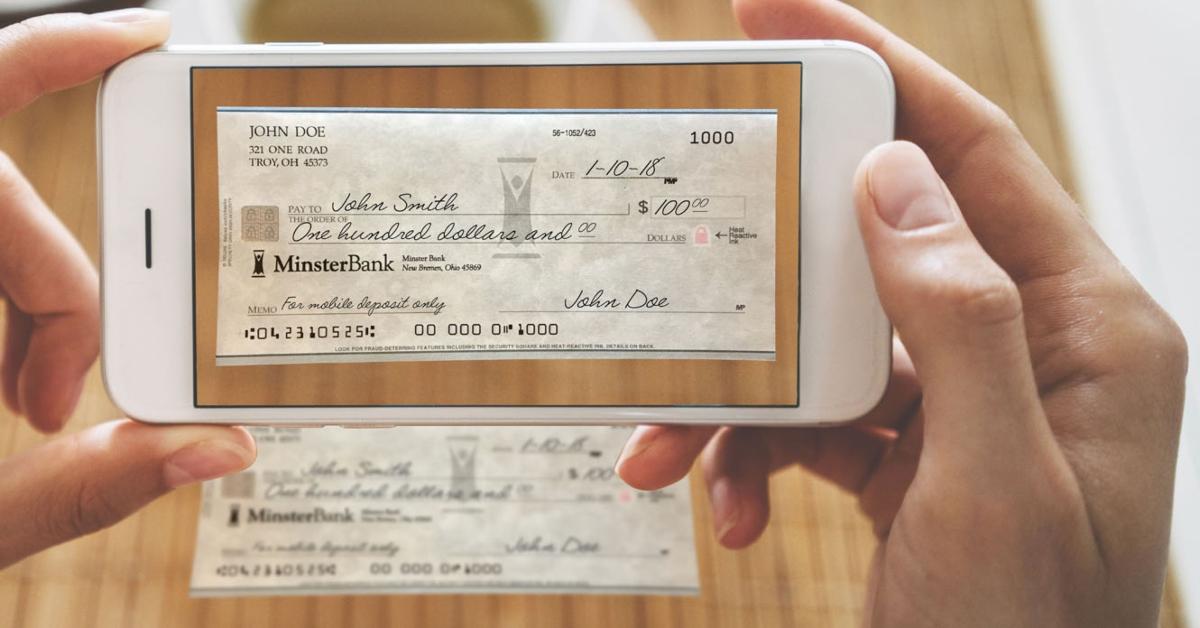Have you ever wondered what happens if you deposit a check twice?
Depositing a check twice is the act of submitting the same check to a financial institution for payment more than once. This can be done intentionally or unintentionally, and the consequences can vary depending on the circumstances.
If you intentionally deposit a check twice, you are essentially trying to cash the same check twice. This is a form of fraud, and it can have serious consequences. You could be charged with a crime, and you could also be held liable for any damages that the bank incurs as a result of your actions.
- Indulge In The Flavors Of Wingstop The Ultimate Destination For Wing Lovers
- The Enigmatic Richard W Untangling The History Of A Legendary Figure
If you unintentionally deposit a check twice, the consequences are likely to be less severe. However, you could still face some penalties, such as having your account frozen or being charged a fee.
To avoid any problems, it is important to be careful when depositing checks. Make sure that you only deposit each check once, and keep a record of all of your transactions.
Deposit a Check Twice
Depositing a check twice involves several key aspects:
- Unraveling Trace Gallaghers Age The Truth Revealed
- Explosive Growth Fashion Nova Owners Burgeoning Net Worth
- Fraud: Intentional double deposits are illegal.
- Consequences: Penalties for fraud can be severe.
- Unintentional Errors: Mistakes can lead to double deposits.
- Penalties: Unintentional errors may still incur penalties.
- Bank Policies: Banks have varying policies on double deposits.
- Account Freezes: Accounts may be frozen during investigations.
- Fees: Banks may charge fees for processing double deposits.
Understanding these aspects is crucial to avoid legal and financial consequences. If you accidentally deposit a check twice, promptly contact your bank to resolve the issue and minimize any potential penalties.
1. Fraud
Intentional double deposits, a form of check fraud, involve knowingly submitting the same check for payment more than once. This illegal practice aims to deceive financial institutions and obtain unauthorized funds.
- Deception: Double deposits intentionally mislead banks, violating trust and the integrity of financial systems.
- Consequences: Fraudulent double deposits are serious offenses, punishable by law. Penalties may include fines, imprisonment, and damage to reputation.
- Bank Security: Banks employ robust security measures to detect and prevent double deposits, protecting their assets and customers' funds.
- Customer Responsibility: Account holders have a responsibility to safeguard their checks and prevent unauthorized use, including double deposits.
Understanding the illegality and consequences of intentional double deposits is essential for maintaining ethical and legal conduct in financial transactions.
2. Consequences
Intentional double deposits of checks constitute fraud, a serious offense with potentially severe consequences. These penalties aim to deter individuals from engaging in such illegal activities and protect the integrity of financial systems.
- Criminal Charges
Individuals caught intentionally double depositing checks may face criminal charges, including forgery, fraud, and theft. Convictions can result in substantial fines, imprisonment, and a permanent criminal record.
- Financial Penalties
In addition to criminal charges, perpetrators may be ordered to pay significant financial penalties, including restitution to the bank and compensation for any losses incurred. These penalties can amount to thousands or even hundreds of thousands of dollars.
- Civil Lawsuits
Banks and other financial institutions may also pursue civil lawsuits against individuals who engage in double deposits. These lawsuits seek to recover damages caused by the fraud and can result in additional financial penalties.
- Damage to Reputation
Double deposit fraud can severely damage an individual's reputation. Convictions and civil judgments can make it difficult to obtain employment, secure housing, and access financial services.
The severe consequences associated with double deposit fraud underscore the importance of ethical conduct and compliance with financial regulations. Individuals should be aware of the potential penalties and take steps to avoid engaging in such illegal activities.
3. Unintentional Errors
Despite the potential for fraud, double deposits can also occur unintentionally due to human error or system malfunctions.
- Data Entry Errors
Mistakes in manually entering check data, such as the amount or account number, can lead to duplicate deposits. These errors can occur during the initial deposit or subsequent processing.
- Duplicate Checks
In rare cases, banks may issue duplicate checks with the same check number. If both checks are deposited, it can result in an unintentional double deposit.
- System Errors
Technical glitches or software malfunctions within the bank's processing systems can sometimes cause checks to be processed twice.
- Human Oversight
In the absence of proper internal controls, human oversight can lead to checks being deposited twice, especially when multiple employees are involved in the process.
Unintentional double deposits, while less severe than intentional fraud, can still cause inconvenience and potential penalties for account holders. It is important for banks to have robust systems in place to minimize the risk of such errors and for customers to be vigilant in monitoring their accounts and reporting any discrepancies promptly.
4. Penalties
Despite being unintentional, double deposits, whether caused by human error or system malfunctions, can still lead to penalties for account holders. These penalties serve as a deterrent against negligence and emphasize the importance of accuracy and vigilance when handling financial transactions.
One common penalty for unintentional double deposits is a fee charged by the bank. This fee compensates the bank for the additional processing and administrative costs associated with resolving the error. The amount of the fee can vary depending on the bank's policies and the severity of the error.
In some cases, unintentional double deposits may also trigger an investigation by the bank's fraud department. This is especially true if the double deposit involves a large amount of money or if there are other suspicious circumstances. The investigation may delay access to the funds and could potentially lead to the account being frozen until the matter is resolved.
Understanding the potential penalties for unintentional double deposits is crucial for account holders to avoid inconvenience and financial losses. By exercising due care when depositing checks and promptly reporting any errors to the bank, account holders can minimize the risk of incurring penalties and protect the integrity of their financial transactions.5. Bank Policies
Banks have varying policies on double deposits, which can impact the consequences and penalties associated with this action. Understanding these policies is crucial for account holders to manage their finances effectively and avoid any potential issues.
- Check Verification Procedures
Banks employ different verification procedures to detect and prevent double deposits. Some banks use automated systems that compare deposited checks against a database of previously processed checks. Others rely on manual verification processes, where bank tellers or other staff visually inspect checks for duplicates. The stringency of these procedures can vary, affecting the likelihood of double deposits being processed.
- Penalties for Unintentional Double Deposits
Banks have varying policies regarding penalties for unintentional double deposits. Some banks may impose a fee for the additional processing required to resolve the error. Others may take a more lenient approach, waiving the fee or providing a warning to the account holder. The severity of the penalty often depends on the bank's assessment of the account holder's intent and the circumstances surrounding the double deposit.
- Account Freezing
In cases where a double deposit is suspected to be fraudulent, banks may freeze the account holder's account. This measure is taken to prevent further unauthorized transactions and to protect the bank from financial losses. The account may remain frozen until the bank completes its investigation and determines whether the double deposit was intentional or unintentional.
- Customer Education and Awareness
Banks play a role in educating customers about the consequences of double deposits and the importance of carefully reviewing account statements. They may provide information on their policies and procedures through brochures, online resources, or direct communication with customers. By raising awareness, banks aim to reduce the occurrence of unintentional double deposits and promote responsible banking practices.
Understanding the bank's policies on double deposits empowers account holders to make informed decisions and take appropriate actions to avoid any negative consequences. By adhering to the bank's guidelines and exercising due diligence when handling checks, account holders can maintain the integrity of their financial transactions and protect their accounts from potential risks.
6. Account Freezes
Account freezes are a significant consequence of double deposits, particularly when the bank suspects fraud. When a double deposit is detected, the bank may freeze the account holder's account to prevent further unauthorized transactions and protect itself from financial losses. This action is taken to safeguard the integrity of the financial system and to allow the bank to conduct a thorough investigation.
The investigation process typically involves reviewing the account holder's transaction history, examining the deposited checks, and potentially interviewing the account holder. The bank's goal is to determine whether the double deposit was intentional or unintentional and to assess the account holder's involvement in any fraudulent activities.
Account freezes can have severe implications for account holders. Frozen accounts limit access to funds, which can disrupt financial obligations, such as bill payments, rent, or mortgage payments. Additionally, account freezes can damage an individual's credit score and make it difficult to obtain loans or other financial products in the future.
Therefore, it is crucial to avoid double deposits, whether intentional or unintentional. Account holders should carefully review their checks before depositing them and promptly report any errors or discrepancies to the bank. By understanding the consequences of double deposits and the importance of account freezes as a component of investigations, individuals can protect their accounts and maintain the integrity of the financial system.
7. Fees
Double deposits, whether intentional or unintentional, can result in fees charged by banks. These fees serve as a deterrent against careless or fraudulent behavior and contribute to the overall cost of maintaining the banking system.
When a double deposit occurs, the bank incurs additional expenses in processing the duplicate transaction. This includes manual verification, investigation, and potential adjustments to account balances. To cover these costs and discourage double deposits, banks impose fees on the account holder.
The amount of the fee can vary depending on the bank's policies and the severity of the error. Some banks may charge a flat fee for any double deposit, while others may have a tiered fee structure based on the amount of the duplicate check. In cases of suspected fraud, the fees may be higher, and the account holder may face additional penalties.
Understanding the potential fees associated with double deposits is essential for account holders. By exercising due care when depositing checks and promptly reporting any errors, individuals can avoid incurring unnecessary charges and maintain the integrity of their financial transactions.Frequently Asked Questions
This section addresses common concerns and misconceptions related to depositing a check twice.
Question 1: What are the consequences of intentionally depositing a check twice?
Answer: Intentionally double depositing a check is considered fraud, which is a serious offense. It can lead to criminal charges, financial penalties, and damage to reputation.
Question 2: What happens if I accidentally deposit a check twice?
Answer: Unintentional double deposits may result in penalties, such as fees or account freezes. It is crucial to promptly report the error to your bank to minimize any negative consequences.
Question 3: How do banks detect double deposits?
Answer: Banks employ various methods to detect double deposits, including automated systems that compare deposited checks against previous transactions and manual verification processes conducted by tellers.
Question 4: What should I do if my account is frozen due to a suspected double deposit?
Answer: Contact your bank immediately to explain the situation and provide any necessary documentation. Cooperate with the bank's investigation to resolve the issue promptly.
Question 5: How can I avoid double deposits?
Answer: Carefully review checks before depositing them, keep a record of deposited checks, and promptly report any errors to your bank. Exercise due diligence to maintain the integrity of your financial transactions.
Summary: Depositing a check twice, whether intentional or unintentional, can have serious consequences. Understanding the risks and penalties associated with double deposits is crucial for maintaining financial integrity and avoiding legal issues.
Transition: For further information on banking practices and financial responsibility, explore the following resources...
Conclusion
Depositing a check twice, whether intentional or unintentional, can have serious repercussions. Intentional double deposits constitute fraud, a criminal offense punishable by law. Unintentional errors, while less severe, can still result in penalties and inconvenience.
It is crucial for individuals to understand the consequences of double deposits and to take steps to avoid them. Careful check handling, meticulous record-keeping, and prompt error reporting are essential practices for maintaining financial integrity. Banks play a vital role in detecting and preventing double deposits through robust verification systems and clear policies.
By adhering to ethical and responsible banking practices, we can safeguard the integrity of the financial system and protect ourselves from legal and financial risks.



Detail Author:
- Name : Octavia Sanford
- Username : lborer
- Email : schaefer.tania@robel.net
- Birthdate : 1981-09-23
- Address : 124 Fay Plains Lake Linashire, IA 07503
- Phone : (508) 840-1074
- Company : VonRueden-Huel
- Job : Biological Scientist
- Bio : Esse quam aspernatur praesentium dolores. Ad magnam quibusdam et sequi nam non. Quasi aut cupiditate omnis sunt ut optio dolor.
Socials
instagram:
- url : https://instagram.com/elian.hessel
- username : elian.hessel
- bio : Numquam ut corrupti sed et impedit consequatur. Sunt iste et distinctio consequatur.
- followers : 874
- following : 2886
linkedin:
- url : https://linkedin.com/in/elian.hessel
- username : elian.hessel
- bio : Ex ex deleniti sit.
- followers : 1568
- following : 1154